80% of parents have concerns about AI in their children’s education

Author
Taylor Hartley

Expert Reviewer
Jill Padfield
Published: July 2024


80% of parents have concerns about AI in their children’s education

Author
Taylor Hartley

Expert Reviewer
Jill Padfield
Published: July 2024




80% of parents have concerns about AI in their children’s education

Author
Talor Hartley

Expert Reviewer
Jill Padfield
Published: July 2024


The rapid advancement of technology, especially in Artificial Intelligence (AI), has permeated almost every aspect of modern life, including education. With tools like ChatGPT serving as educational aids, it’s important to take a look at how parents think and feel about such technologies and the impact they will have on their students.
Studies show that teachers and students embrace ChatGPT and AI in education, but we rarely hear from parents.
So, we wanted to understand parents’ perceptions of AI’s role in their children’s education.

Methodology and Grade Levels
We surveyed 1,000 parents aged 18-54 with kids in school. Below is a breakdown of the ages of the children our survey respondents had:
A pivotal aspect of AI’s incorporation in education is the degree to which parents are familiar with such technologies. Overall, there is a moderate familiarity with AI tools like ChatGPT.
The data revealed a promising trend: more than half (53.8%) of respondents were “Moderately familiar” with AI technologies like ChatGPT, while a sizable 29.4% were “Very familiar” with these tools.
On the other hand, 16.8% were “Not at all familiar.”
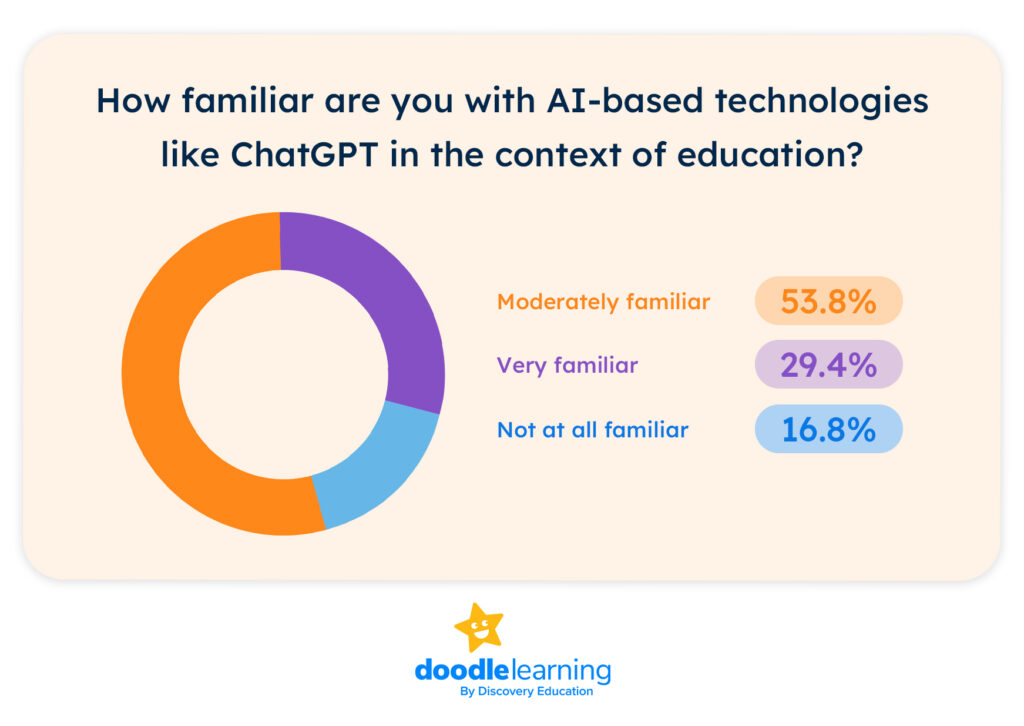
Artificial intelligence (AI) is used in education to personalise learning, provide real-time feedback, and automate tasks. One recent survey from the United States shows ChatGPT being used in the classroom by over 60% of school teachers. It’s still unclear how teachers are utilising ChatGPT, but the technology has the ability to answer questions, provide support, and even help grade papers.
AI in education expands much further than just ChatGPT, however. Numerous AI tools and software powered by AI exist in the education space. AI technology can help analyse student data to identify trends and patterns, which can improve teaching and learning. AI-powered virtual tutors can provide personalised instruction, while adaptive learning platforms tailor instruction to each student’s needs.
While familiarity is high, so are concerns. Fifty-eight percent of respondents were “Moderately concerned” about AI’s influence on their child’s education, and 22 % were “Very concerned.”
In contrast, only 19.9% were “Not concerned at all.”
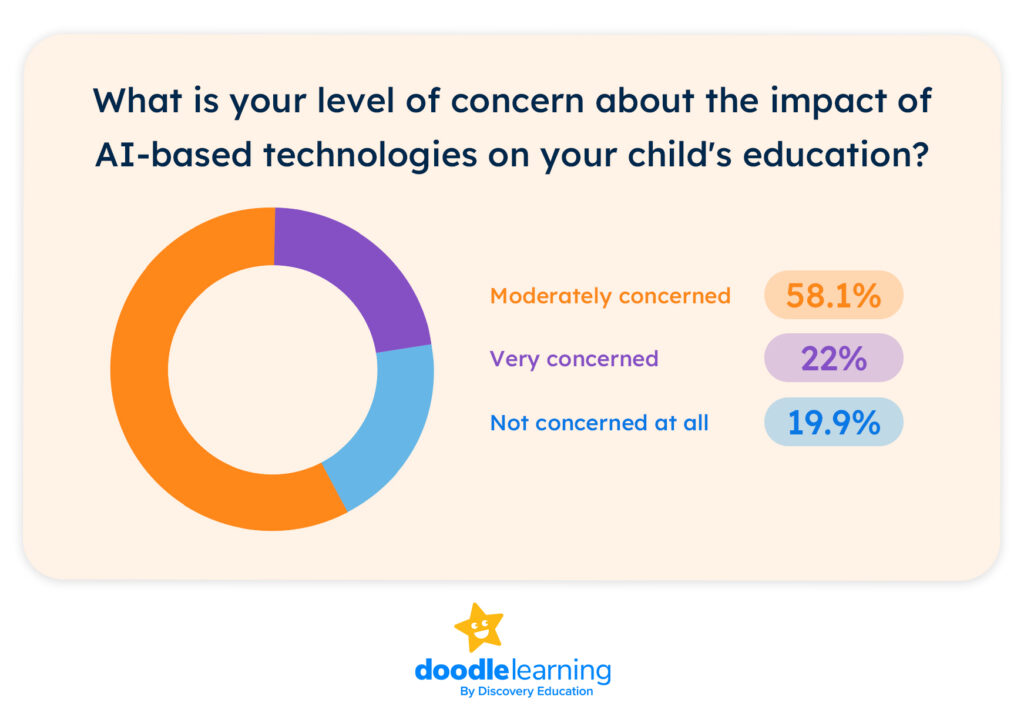
The nature of these concerns varied:
Privacy and data security are paramount concerns for parents, with 58.9% expressing anxiety over this issue, mirroring the more significant societal fears around big data and privacy. Similarly, the lack of personalised learning of AI-generated content drew substantial apprehension, with 47.8% and 48.8% of parents questioning AI’s role as an effective educational tool.
On the other hand, nearly half (48.1%) were wary of AI’s implications for academic integrity, fearing it might inadvertently encourage cheating or plagiarism.
Lastly, the concern that AI tools in education might diminish interpersonal skills was evident in 43.6% of parents, echoing long-standing worries about technology’s impact on social development.
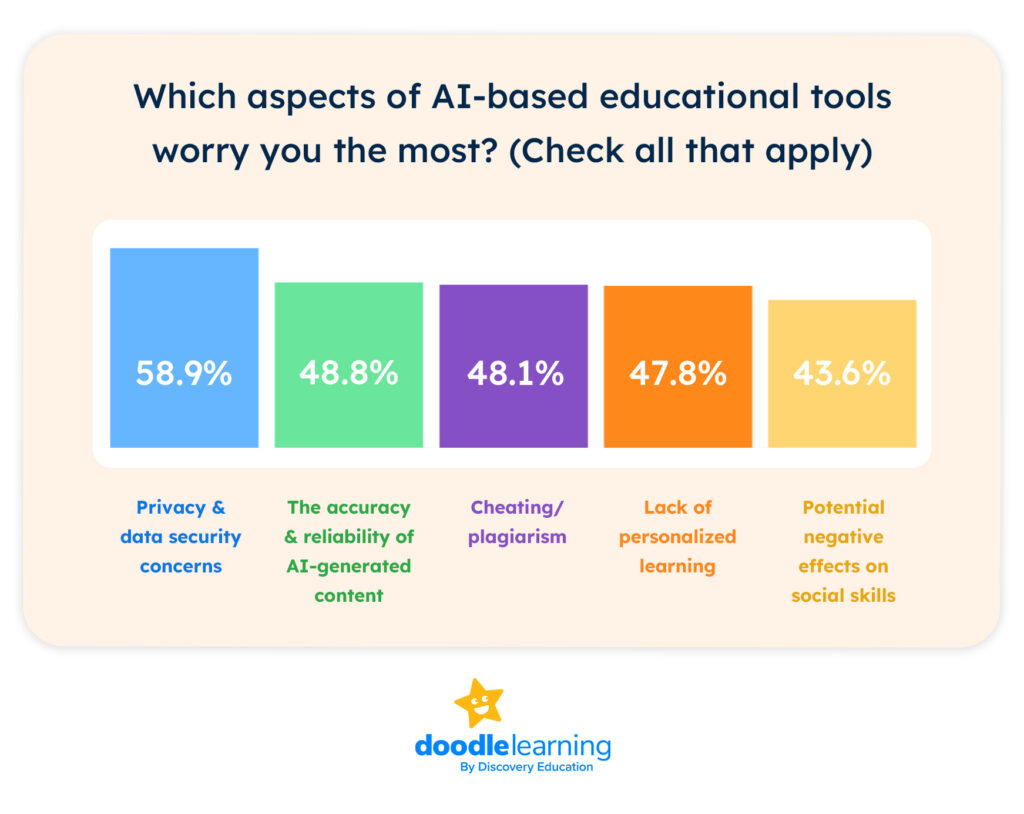
It’s no secret that the general public is wary of privacy in technology. Studies from Cisco and Pew Research Center found that leading concerns of AI are data security-based, whether that’s data being used to track movements, discriminate against them, steal identities, or spread misinformation.
AI has slowly been making its way into the classroom, generally being used to reduce the workload for teachers and administration. The introduction of ChatGPT has shifted how AI can be used in education dramatically, giving students tools that were recently unfathomable. “Once a student knows that they can type in any question or essay I give into ChatGPT, the old reasons we used to give for learning a topic become irrelevant” says a former maths teacher, Jill Padfield. “Now that AI is at the tip of any child’s fingers, we need to reconsider our curriculum and what skills and topics should be prioritised.”
Teachers and administrators are grappling with how new technology will influence what skills we teach in school. Just as the introduction of the calculator in the 1970’s revolutionised the maths curriculum, the adoption of AI will surely influence what skills and mastery will be expected of our students. Finding the balance between the topics that must be learned and memorised and those that can be left to AI will be at the forefront of many future curriculum debates.
One of the most telling statistics revolves around communication. Only 35.4% of parents had discussed AI and ChatGPT usage with their children. The majority (64.6%) had yet to broach the topic. These results suggest a potential gap in family dialogues about technology, its benefits, and its potential pitfalls.
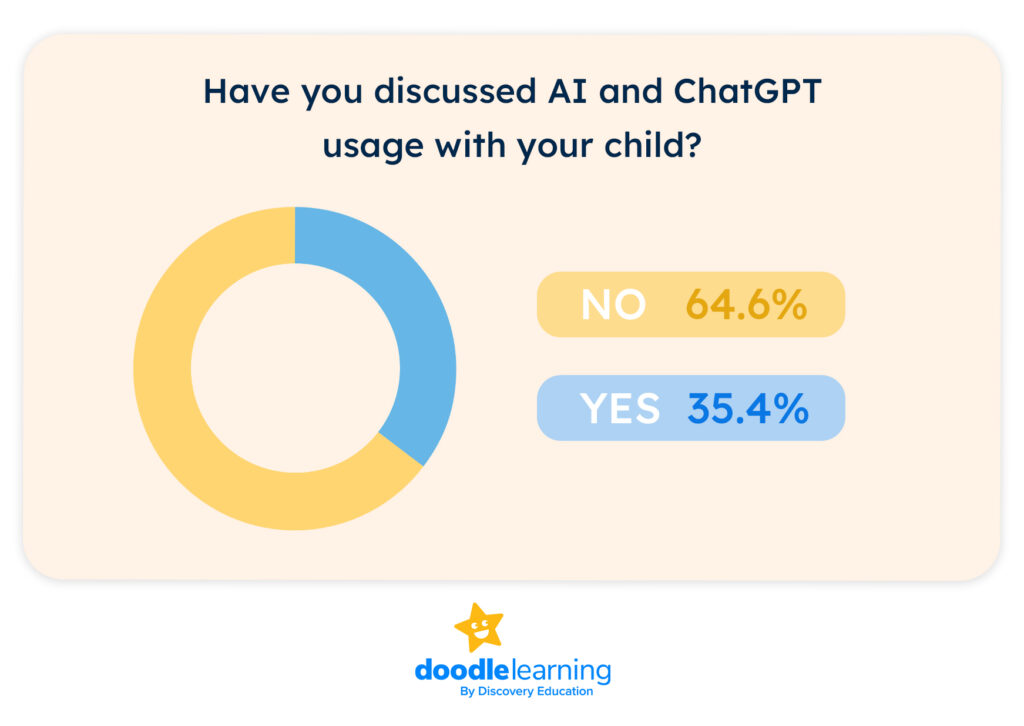
If you’re unsure how to speak to your child about using AI in the classroom, here are some tips:
AI can be thought of as a computer “brain” that learns from information, similar to how children learn things in school. It’s like a helpful assistant for certain tasks. It’s essential for young children to always ask a parent or teacher before diving into a new online tool, ensuring that they’re engaging with safe and accurate resources. While AI has fun aspects, such as voice assistants that can sing or answer curious questions, the human element remains essential. The joy of learning with teachers and friends, experiencing emotions and shared excitement, can’t be replicated by any computer.
For older children, AI’s potential in education can be vast, from offering personalised learning experiences to raising questions about the safety and privacy of user data. They should be encouraged to ask questions, explore further, and reflect critically on what AI brings to their learning environment. Ethical considerations, like the fairness of an algorithm, become important topics of discussion.
The value of human-driven education, focusing on interpersonal skills, teamwork, and peer discussions, remains unparalleled even in the age of advanced technology. As AI becomes an integral part of the education system, it’s beneficial for parents and children to stay updated, exploring new AI-driven tools collaboratively and understanding their potential impacts on learning.
Despite the concerns, some believe there is potential for a bright future for AI in the classroom. Bill Gates recently commented that AI could help alleviate the overworked teachers and offload some tasks to allow them to spend more time helping students one-on-one.
From our study, 53.8% of parents believed that AI has the potential to impact their child’s education positively. Only 11.2% thought the opposite, with over a third (35%) remaining unsure. There is clearly a divided, albeit generally positive, perception of AI’s role in the learning environment.
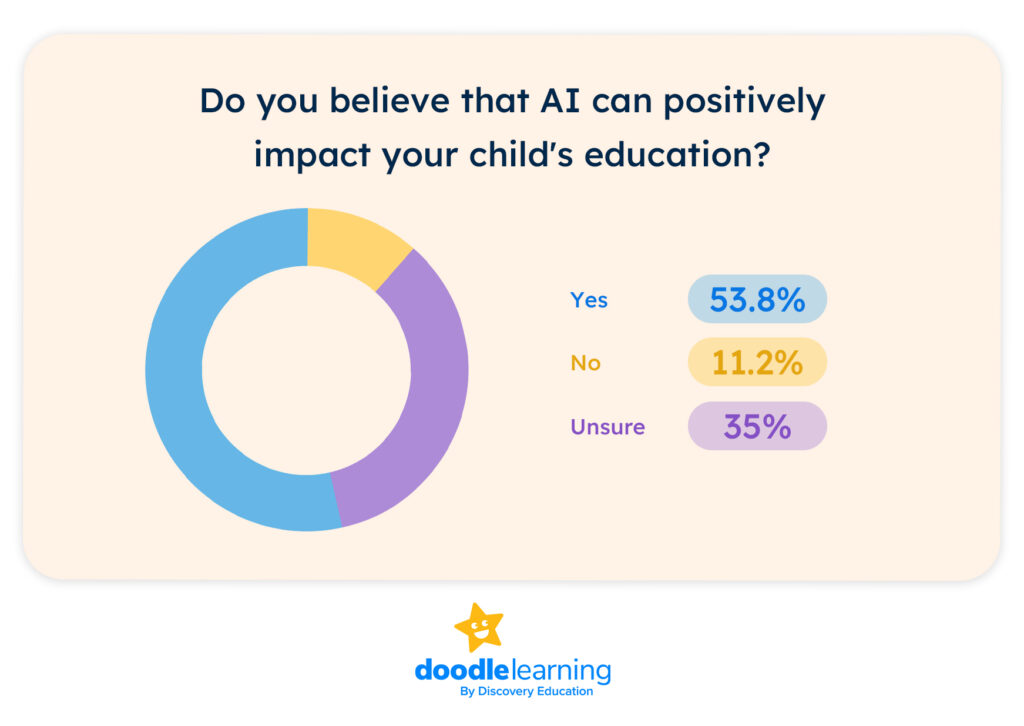
The education landscape is undergoing a profound transformation with the introduction of AI. As illuminated by this survey, parental perceptions reveal a complex interplay of enthusiasm, awareness, and concern.
To ensure a harmonious integration of AI into the classroom and homes, educators and technologists need to address these concerns, particularly around privacy, personalization, and the overall efficacy of AI as an educational tool.

Parents, sign up for a DoodleMaths subscription and see your child become a maths wizard!

Book a chat with our team
If you’d like to use Doodle’s browser version, please visit this page on a desktop.
To log in to Doodle on this device, you can do so through our apps. You can find out how to download them here: